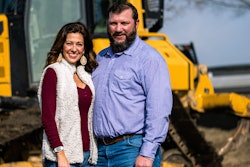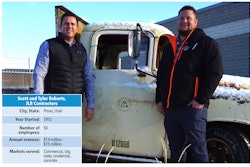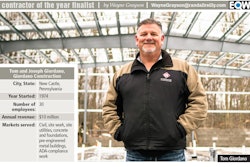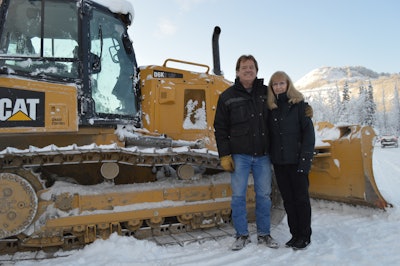
It all started with a newspaper ad and a dare.
Scott Johnson had worked for 20 years in residential construction, advancing to superintendent. Then the bottom fell out of the housing market in 1987 in Alaska. He went to work at an oilfield on the North Slope running heavy equipment, but he didn’t like it much.
Then in 1989, he saw the newspaper ad: a backhoe and dozer with only 400 hours each and a trailer and a dump truck for $65,000. For that price, the truck and trailer were essentially thrown in for free.
So he and his father, who had been a mechanic at the N C Machinery Caterpillar dealership, went out to take a look. On the way back, Scott began to have second thoughts.

His father quickly responded, “Well, if you don’t buy it, I will.”
Scott heard a challenge in that response. “And it was almost a dare,” Scott says and laughs.
“And I bought it.”
So began Dirtworks Incorporated in Palmer, Alaska. Dianne Johnson, Scott’s wife, turned the kitchen table into the fledgling company’s office. She kept the books, handled the finances and whatever else was needed to help get the business off the ground. She had a good teacher in her mother, who had done the same for their family’s dairy farm, which at one point had been the largest in Alaska.
Scott began landing jobs: a subdivision road, demolition work, septic tanks. He later brought on board two workers. His 8-year-old son, Scottie, was also ever-present on the jobsites.
Today, Scott and Dianne have built a business worth $5 million to $7 million that has branched out into multimillion-dollar commercial and government projects. Their son Scottie and daughter Dawn are also on board helping the company diversify and using technology to increase efficiency and productivity. Though it has grown exponentially, Dirtworks continues to hold to its humble beginnings, still willing to install septic tanks, build driveways or other small jobs that many commercial companies shun.
“It is very unusual that a company combines commercial and residential to the level this company does,” says Ben Conroy, Dirtworks estimator. “I’ve never been anywhere else that does a pure hundred-dollar-up residential crew and a pure full-on commercial crew integrated well.”
Being able to do both requires employees that can do both, which is also rare. “We have multi-talented people,” Dianne says. “They aren’t just able to do one thing.”
And with Alaska’s short construction season, where commercial work basically comes to a standstill because of the harsh winters, the residential work provides steady revenue. It also helps draw in bigger jobs.
“I think the residential is really important because of your connection with the community, and we get a lot of business by word-of-mouth,” Dianne says.
Moving into commercial
As the housing market started picking up, so did the business. In 2000, the company moved to its first building. The years of 2000 to 2010, saw 50 percent growth.
The work to this point was mostly private residential with some large projects flowing their way. In 2010, they began bidding for commercial work. Scottie, who has grown up with the company, has taken on the commercial side of the business.
“I’ve only worked one other place,” Scottie says. That was one summer doing civil and demolition work for a cousin in Anchorage.
He tries to focus as much time as he can on bidding and estimating, but sometimes a worker quits mid-season, which means he has to return to operating equipment.
“He has spent a lot of time brainstorming ways to diversify, and he’s done a lot of research,” Dianne says. “He’s become a huge part of the company.”
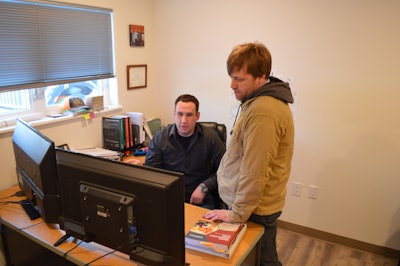 Ben Conroy, left, and Scottie Johnson
Ben Conroy, left, and Scottie Johnson
After the company’s first $1 million commercial project, it entered the aggregate business, opening a 40-acre gravel pit. Then came a $2 million city utility job. Scott says the company has stayed steady in commercial work ever since. It has also landed multiple jobs on military bases for such projects as water and sewer systems and building footprints.
 Denali road project
Denali road project
The crew had to work at night so as not to disrupt the heavy tourist traffic. Alaska’s midnight sun helped, but it was still a 10 p.m. to 6 a.m. job. Dirtworks doesn’t have a night shift, so the crew was doing round-the-clock double shifts, catching a few hours of sleep in between jobs.
Another challenge was the park’s strict rules to prevent invasive species from entering the gates. The trucks and equipment had to be pressure-washed and spotless. “I’m talking showroom clean to bring it in there,” Conroy says.
The company’s hard work won high praise, earning Dirtworks the 2018 Excellence in Construction Award from the Associated General Contractors of Alaska.
Taking advantage of technology
Dawn joined the company in 2011. She operates equipment and keeps the maintenance shop running during the winter offseason. She was instrumental in the company’s transition to GPS surveying and machine control.
 Dawn Johnson in a trench box
Dawn Johnson in a trench box
“We don’t do anything without it.”
The company has also been shifting away from paper documents to a cloud-based app. Conroy says the app gives a daily time-stamped, partially pre-filled report of the project with photos and that day’s weather. “It’s recorded forever,” Conroy says. “There’s no paperwork.”
Maintaining integrity
Though the company has advanced in technology, it has held onto some old-school values. One important one being, no debt, including on their 7,200-square-foot shop and office.
“Scott and I have, since we started the company, tried to do everything as much as possible out of pocket,” Dianne says. “There’s no money owed on this, there really never has been.
“So we feel good about that. We can look and say, ‘Yeah, we did this, and we owe nothing on it.’”
Along with staying debt-free, the company believes in building a reputation for integrity, which Dirtworks’ owners and employees have done for 31 years.
“I believe the high quality of their work stems from the owners’ direct influence on all their employees,” says Micah Schoming with CRW Engineering. “I appreciate the genuine and caring attitude all Dirtworks employees have toward the work they create for each project.”
Anything less, Scott says, won’t cut it.
“In my years working here, I’ve seen lots of companies come and go,” Scott says. “There’s a lot of competition here, and no matter how long you’ve been in business, you’ve got to continually do good work.”
 The Denali jobsite
The Denali jobsite

